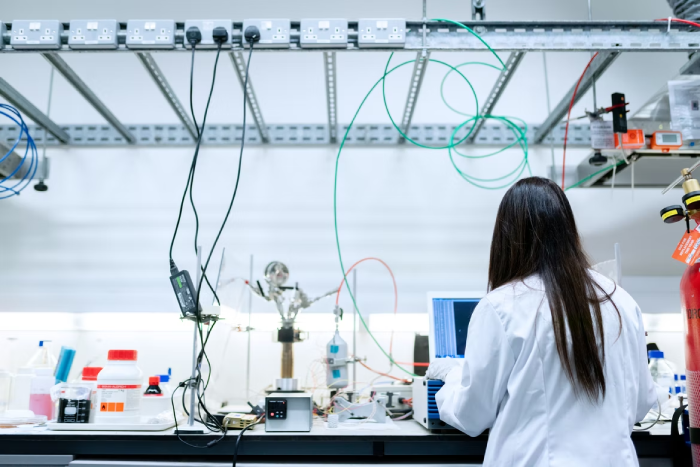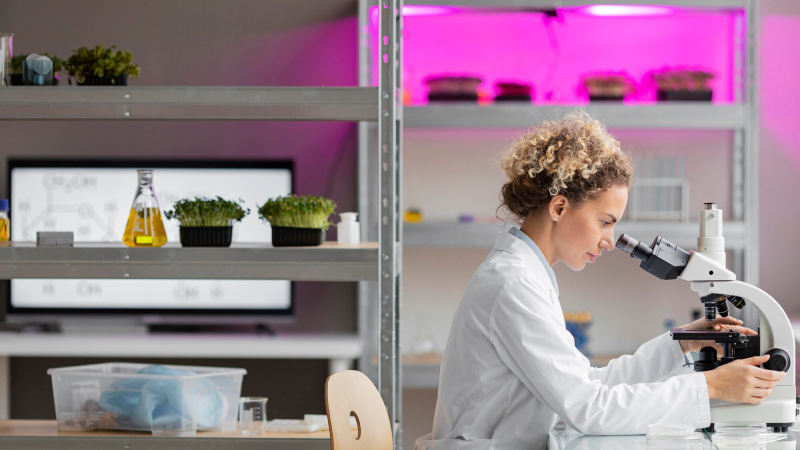
Synthetic biology is a new interdisciplinary field that applies engineering principles to biology. It focuses on the design and manufacture of biological components and systems that are not yet found in nature.
What is synthetic biology?
This discipline for designing and building controllable metabolic and regulatory pathways, circuits and networks. It also enables the creation of new enzymes, signaling pathways and whole cellular systems.
Applications of synthetic biology
The various approaches associated with synthetic biology, such as the design of gene and protein sequences of standard biological parts, the development of synthetic genetic codes, and the creation of artificial cells and organisms, will undoubtedly advance the application of knowledge in a variety of scientific fields. fields. and technology.
By redesigning existing biological parts, the feature set for biological processes is expanded. Synthetic biology offers new insights and new biological innovations.
The development of technology platforms or the creation of new or improved physical structures can be used to implement and benefit from new features.
Synthetic biology combines advanced knowledge of genetics with the chemical synthesis of DNA, allowing researchers to rapidly create cataloged DNA sequences and assemble them into new genomes.
The main synthetic biology definition and purpose is to enable the development of new organisms that can be engineered to produce useful products such as drugs, as well as chemicals, fuels and materials that circumvent the use of non-renewable fossil fuels.
The increasing speed and cost of DNA synthesis gives scientists access to advanced biofuels, bioproducts, renewable chemicals, bio-based specialty chemicals, pharmaceutical intermediates, fine chemicals, and food ingredients.
It has been used to manipulate human and bacterial, viral and plant cells to create compounds or modify activities that may have benefits for human health.
To define synthetic biology, it starts with its ability to enrich plants by manipulating T cells, synthetic biology has had a significant impact on human health and the treatment of disease.
There are many applications for synthetic biology. In this section, we will explore the various industries impacted by synthetic biology.
In biology and medical research
Synthetic biology offers a new direction of research for the treatment of disease. It is the engineering of cells or bacterial communities for therapeutic and diagnostic purposes.
For example, Salmonella carrying genes for synthetic atrial drugs can control tumor growth by releasing drugs in a time-dependent manner in response to the hypoxic tumor microenvironment.
In 2010, viruses were developed that target brain tumor cells. Viral oncolytic therapy has been used to block blood vessel growth in brain tumor cells by targeting a protein called vascular statin, which inhibits blood vessel growth.
Synthetic biology has also recently been used to manipulate metabolic processes for human health. One example is sitagliptin, a drug designed to improve insulin secretion by inhibiting an enzyme called dipeptidyl peptidase 4.
Biofortification for human health
Synthetic biology also benefits human health through biofortification. It is the production of crop varieties that have improved nutrient profiles through conventional or genetic manipulations.
Several notable crops have been developed, such as golden rice, which is enriched with beta-carotene, purple tomato and purple endosperm rice, which contain high levels of anthocyanins, and aSTARice, an iteration of golden rice which leads to the production of the carotenoid astaxanthin.
Golden rice has also been further refined to increase the iron and zinc content. This serves as a proof of concept demonstrating that foods with improved nutritional capacity can be developed to meet minimum daily requirements for essential minerals and vitamins.
Pharmaceuticals
Synthetic biology has the potential to develop applications in the real world. Synthetic biology can transform food, raw materials and medicines.
Many biotech, pharmaceutical and agricultural companies emphasize the application of synthetic biology tools developed from 2000 to 2021 and available now or in the coming years.
Over the next decade, more products will achieve superior performance and affordability thanks to engineering biology. The field is already influencing life sciences, pharmaceuticals, and large-scale industrial applications.
The use of synthetic biology is particularly important in situations where certain plant species are at risk of extinction. For example, rhodiola is becoming increasingly rare due to harvest due to the benefits it provides.
The discovery of biosynthetic pathways led to the production of salidroside, a biofunctional component of radiola, which has effects such as mood stabilization, fatigue improvement, and cardiovascular cancer prevention.
Using transcriptomics and metabolomics, N. Ventamiana, which allows large-scale production of compounds.
Artificial intelligence
Those who might be wondering how artificial intelligence is changing the field of synthetic biology, in recent years, there has been an explosion of interest in the field of synthetic biology, as researchers look to harness the power of living organisms for a variety of applications.
A key driver of this growth has been the increasing capabilities of artificial intelligence (AI) technologies, which are providing new ways to design and engineer biological systems.
One area where AI is having a major impact is in the field of DNA synthesis. In the past, synthesizing long stretches of DNA was a time-consuming and expensive process.
However, recent advances in AI-enabled software have made it possible to automate DNA synthesis, leading to a significant reduction in cost and speed.
This is enabling synthetic biologists to create ever more complex designs, and paving the way for the mass-production of genetically modified organisms (GMOs).
Another area where AI is playing a role is in metabolic engineering where AI algorithms are being used to optimize existing biological pathways or design completely new ones from scratch.
It enables the production of novel compounds and chemicals that could have a wide range of applications, from treating diseases to making more sustainable fuels.
AI is also being used to design new microorganisms with specific functions. For example, scientists are using AI to develop bacteria that can clean up oil spills or neutralize hazardous waste.
In the future, it is even possible that AI will be used to create custom-made organisms for specific tasks, such as producing a particular medication on demand.
Overall, AI is having a transformative effect on the field of synthetic biology. This technology is providing new ways to design and engineer living systems, leading to a wave of innovation in this exciting area of research.
Future of synthetic biology industry
The global synthetic biology market is projected to increase in 2027 at a phenomenal CAGR of 26.5% over the assessment period (2022 to 2027).
Synthetic biology, also known as engineering biology, is a relatively new field that combines engineering and biological methodologies to design or redesign biological systems to produce useful and sustainable new products.
Synthetic biology startups
Since the early 2000s, the field of synthetic biology has seen significant growth and investment. This is largely due to advances in DNA sequencing and synthesis technologies, which have made it possible to design and build custom biological systems for a variety of applications.
One application that has gained a lot of attention in recent years is the use of synthetic biology for the development of new drugs and therapies.
In particular, startups are using synthetic biology to develop novel therapeutic proteins and enzymes that can target specific diseases.
There are also a number of companies working on developing cell-based therapies that use genetically-modified cells to treat conditions like cancer or diabetes.
Another area where synthetic biology startups are making an impact is in the development of sustainable biofuels. A number of companies are working on engineering microorganisms that can convert plant matter or waste products into fuels like ethanol or biodiesel.
These efforts could help reduce our reliance on fossil fuels and make biofuels a more viable option for powering vehicles and other industrial applications.
Yet another area of interest for synthetic biology startups is the development of new food and agriculture products.
For example, there are companies working on developing engineered yeast that can be used to produce healthier and more sustainable food ingredients. Others are working on developing genetically-modified crops that are resistant to pests or drought.
These efforts could help increase the global food supply while reducing the environmental impact of farming.
Overall, the growth of synthetic biology startups is providing a boost to the industry as a whole. These companies are helping to drive innovation and commercialization in the field, and their work is paving the way for even more advances in the years to come.







